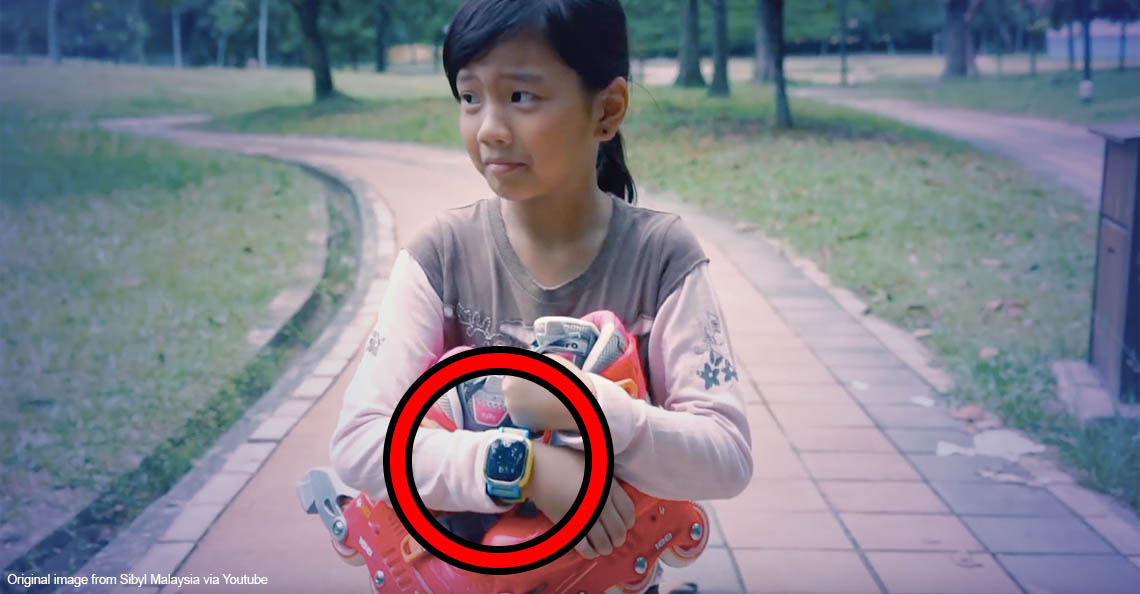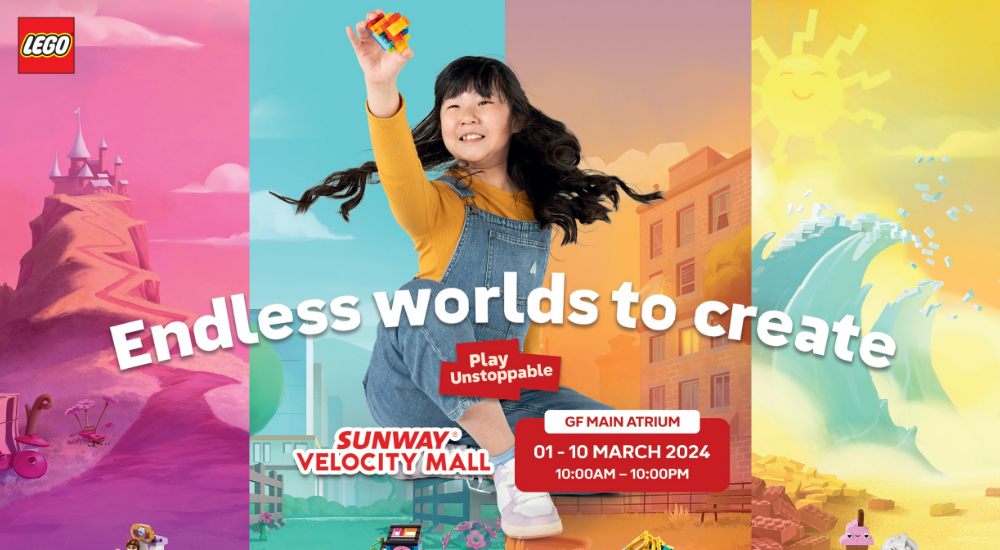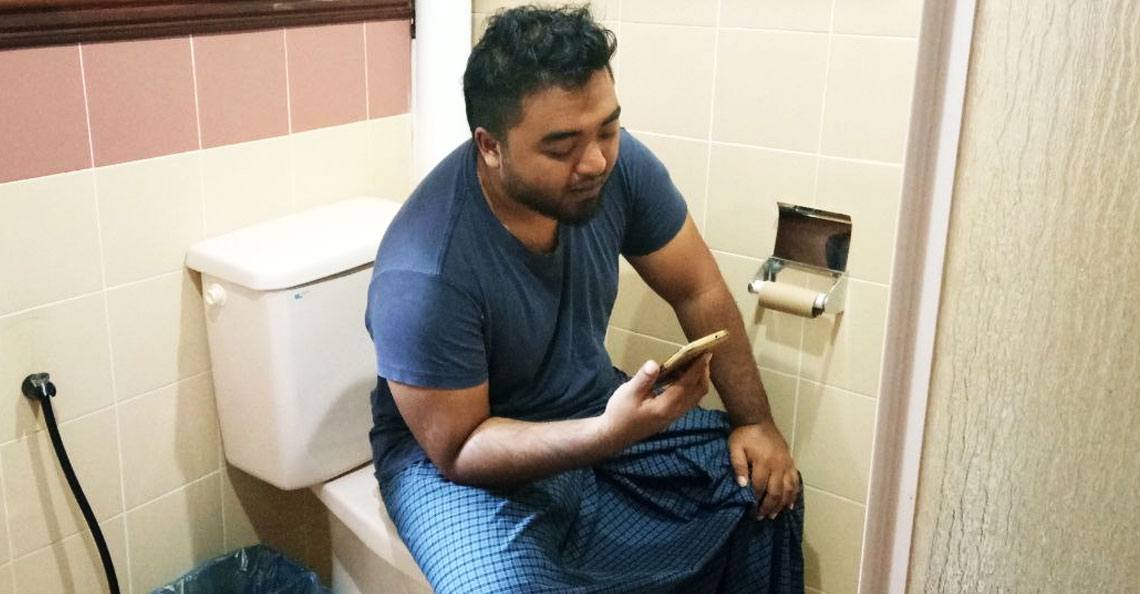Raising a baby in 2018: 6 arguments Malaysian millennial parents always have with their parents
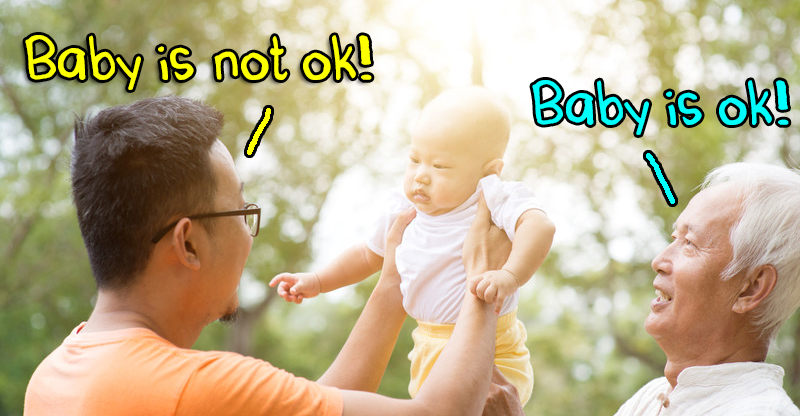
- 708Shares
- Facebook616
- Twitter3
- LinkedIn18
- Email17
- WhatsApp54
You finally have your baby after a 9-month wait that seemed forever and you take her back to your home. Your cooing parents and parents-in-law instantly fall in love your baby and help you as much as they can to ease you and your husband into the parenthood journey. Cantik!
Well.. that is… until they open their mouths to comment on every single thing that you, as a parent, is doing wrong.
You lift the baby, and they say, “Haiyo, become mother ready but still don’t know how to carry a baby ah?”.
You put her in pampers, and they say, “All you know is pampers! It’s not good for the skin, put the baby in cloth diapers la!”.
So much so that you are on the verge of pulling out your hair if they utter another sentence that begins with, “That’s wrong la! That is not how you do it. I know, I’ve raised 10 kids!’.
Raising a baby is a 24-7 job that is totally stressful especially to inexperienced, first time parents. Add ‘the noise’ from well-meaning older parents to the equation, and some millennial parents can lose their minds.
The difference in opinions between these two generations can create a tense situation in the family, and millennial parents more often than not find themselves in awkward situations where they may come across as rude if they do not stick to their parents’ beliefs, while trying to provide the best to their own babies. There is truly no tactful way to do this. Trust this writer to know – she’s recently had a baby too!
CILISOS sought out the expert opinion of paediatrician a.k.a. the master of babies, Dr Cham Weng Tarng, Consultant Paediatrician and Paediatric Rheumatologist from Sunway Medical Centre to shed light into the mysterious ways older parents wreck havoc in millennial parents’ minds and to clear the air on what is right and what is wrong:
1. Giving water to baby below 6 months of age
Millennial parents: “We won’t give water to our baby until he/she is 6 months old. Google says so.”
Older parents: “Humans cannot survive without water. The baby will die of thirst! Give him/her some water to drink la!”
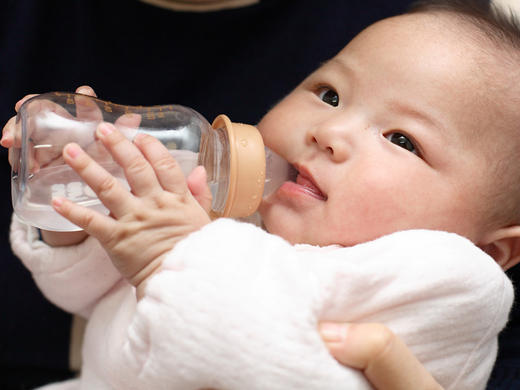
Mother of two young kids based Kajang, Nadia Rahman, tells us that her mother-in-law suggested that she give water to her daughter, who was then only five-months-old. But being someone who preferred going with what doctors say, she disagreed.
“I explained to her the consequences and risks that my daughter will face if she was given water at that age.
She seemed to understand what I was trying to tell her, but that did not stop her from ‘hinting’ for us to at least ‘try’. For what reason, I am not sure!” – Nadia Rahman, mother of 2
Well, humans need water to survive. Babies are humans. As such, they need water. Simple enough right? But then right, it might not be as simple as that. See, babies may be humans but they are tiny beings that have their very own ‘special care plan’.
More and more medical caregivers (including your neighbourhood Klinik Ibu dan Anak or other hospital kerajaan) are educating millennial parents nowadays on why you should not give water to babies below 6 months old. It would not be an exaggeration to say that water in excess may be dangerous to babies below 6 months old.
In fact, a couple in the US have been charged for ‘murdering’ their 10-week-old baby with excess water. o_O
Parents of Nevaeh Marie Landell, Herbert George Landell, 26, and Lauren Heather Fristed, 25, watered down the breast milk given to Nevaeh, causing her electrolyte and sodium levels to drop and made her brain swell. Since Nevaeh was born, Landell and Fristed also refused to get their daughter medical treatment. A month after Nevaeh died, both her parents were arrested and charged.

However, parents of millennial parents find that fact hard to digest. Can’t blame them, though! During their time, such ‘nonsense’ as they would call it, was totally unheard of.
Here’s what Dr Cham told us about feeding babies with water:
“Babies below the age of 6 months old do not need water as there is enough water content in the milk given to them, which enables proper digestion and provides ample hydration. This does not only apply to breast milk fed babies.
Even formula (a.k.a baby milk powder) fed babies get enough water and nutrition from the milk formula and thus water is not needed at all.” – Dr Cham Weng Tarng to CILISOS.MY
Not only that ugaiz, according to a paediatric physician, too much water can also lead to oral water intoxication, which is where the electrolytes in your baby’s bloodstream become diluted and inhibit normal body functions which could lead to low body temperatures or seizures. Giving too much water to babies causes their bodies to release sodium because their kidneys are not matured yet, which in turn, can among others, affect brain activity.
2. Giving solid food to baby
Millennial parents: “Baby will only get her first taste of rice or other baby food only when she turns 6 months old. The nurse reminds us of this at every monthly check up.”
Older parents: “Oh my god! Don’t listen to them la. They don’t know! Humans need to eat. Chuck some cereal into her milk. Nobody will know!”
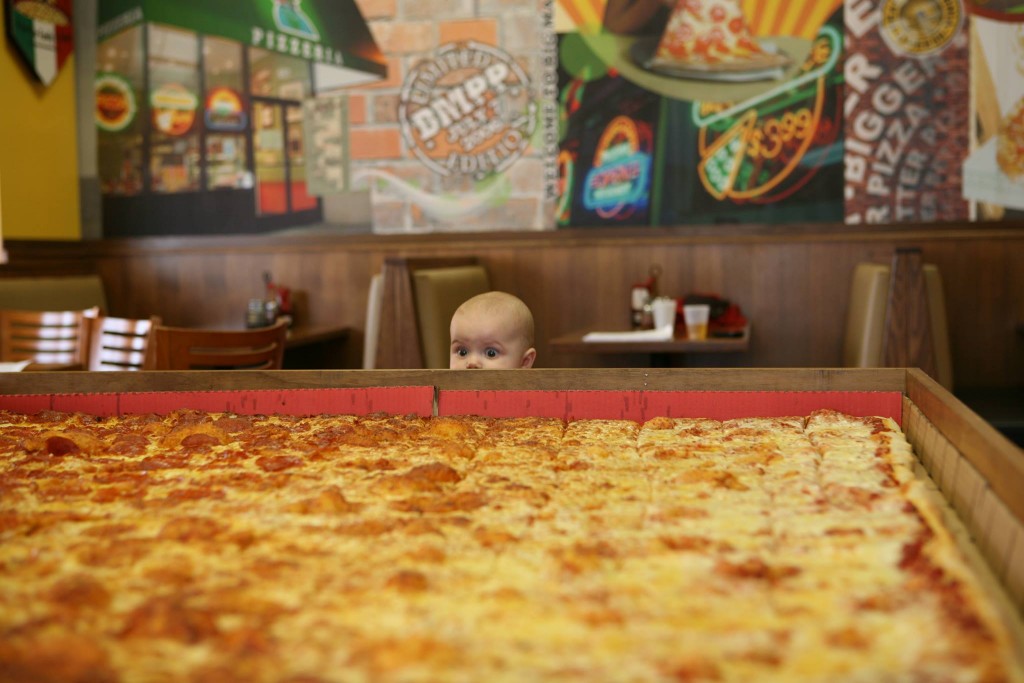
Punitha, mother of 1 based in Petaling Jaya, travels a lot due to the nature of her job. Because of this, she had to leave her two-month-old son with her mother most of the time. By then, the doctors had already advised the couple not to feed their baby with solid food until the age of 6 months.
“I did not even ask my mother whether she knows this. I just assumed she knew about it as she raised me and four other siblings.
One fine day, I came back home and saw her feeling cereal to my baby. I was shocked and an argument ensued where my mother insisted that babies need solid food before 6 months old.” – Punitha, mother of 1
Are you one of those people who assume babies eat Nestum until they are slightly older? Then digest this information. Babies should only drink milk until he/she reaches 6 months old. Why you ask?
Dr Cham stressed that solid food ie: cereal, purees, should only be introduced when babies reach the age of 6 months old because at that age, a baby’s neck will be strong enough to stay stable when sitting to swallow the solid food.
Plus, there is a risk of choking when starting solids earlier. Also, babies have enough iron stores in their bodies to last them for 6 months, after which it depletes. After that, the lack of iron will lead to anemia and milk should not be the only source of nutrition.
3. Adding salt and sugar to baby food
Millennial parents: No way we are going to add salt or sugar into our baby’s food. Its OK if we are adding tonnes of salt to our fries or top our ice creams with extra caramel sauce, but we want out baby to be the healthiest baby in the world.
Older parents: Haiyo, will you eat food without salt or sugar? Same with your baby la! She’s not a goat, she is a baby. Add a little salt or sugar, if not babies won’t eat.
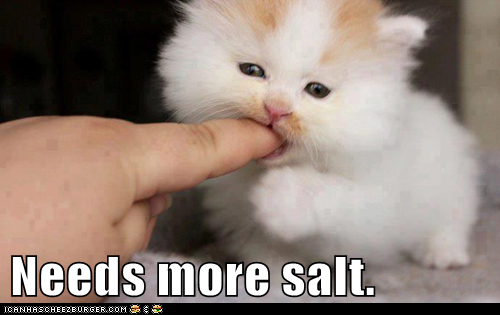
Sure, we add salt to everything you cook. Heck, we even add salt to already salted dishes that you order in restaurants. And oh boy, don’t we love sugar! It’s no wonder that almost one in five Malaysian adults has diabetes.
Yup, we love our seasonings so much that we even chuck some good amount into our baby’s food (at least, we used to do so).
“My mother-in- law is a great cook and loves feeding people, especially her grandchildren. So, when both my children started eating solid food, she suggested so many ‘things’ to make their food more ‘sedap’.
This includes adding salt, anchovy powder and chicken broth cubes – which has a high sodium content- into their food. Despite a little explanation on why we can’t put ‘extras’ into baby food, she still insists putting in some for added flavour”. – Nadia Rahman, mother of 2
However, millennial parents are slowly being aware of the health hazards of adding sugar and salt into their babies’ food and are slowly refraining themselves from doing so.
“Salt and sugar is not advised to be given to babies as their kidneys are still immature to handle and filter such substances. Besides that, sugar can make babies obese.” – Dr Cham Weng Tarng, in an interview with Cilisos.
Although everyone would love to play with and pinch a plump baby, think about the health consequences, ugaiz!
Salt increases the risk of high blood pressure in babies. High salt content in the body can also lead to dehydration. Sugar on the other hand, increases the risk of tooth decay in babies. High sugar content in your baby’s diet can also increase the risk of diabetes when he or she grows up. Babies only need less than 1g (0.4g sodium) a day until they are 12 months. After the baby turns 1, the daily recommended maximum amount of salt for him/her, until he/she is three years old is only 2g a day (0.8g sodium).
4. Babies with jaundice needs sunlight
Older parents: Babies with jaundice needs to be sunbathed. Sunlight cures jaundice. We ‘baked’ you in the sunlight as well. You didn’t die! So, can you do expose newborns to sunlight to cure jaundice?
Millennial parents: What nonsense? Hahaha.
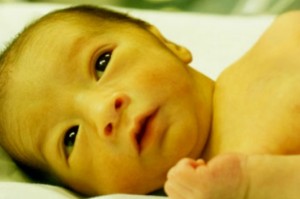
Wondering what in the alien is ‘jaundice’? Well, have you ever happen to see a baby that looks ‘yellow’ especially the skin and white of the eyes? Yup, there you go, that’s a baby with jaundice.
Jaundice is an ailment in newborns caused by bilirubin, a yellow substance that’s made when the body breaks down old red blood cells. It happens because babies’ organs aren’t yet able to get rid of excess bilirubin very well. Newborn jaundice is very common and usually go away on its own as a baby’s liver develops.
However, when jaundice is serious, it can cause seizures changes in muscle tone may occur and if not treated immediately, permanent brain damage or even death can occur. Severe jaundice is treated through phototherapy (you know, the see through container with the purple lights that you see in children’s ward).
However, older parents are adamant that jaundice will miraculously disappear by exposing babies directly to sunlight.
“When my daughter was hit with severe jaundice, my mother insisted that we ‘bake’ her in the sun. Our doctor advised us against doing exactly that.
So I strictly told my mother not to expose my baby in the sun. She nodded obediently. Thinking she would not do what we told her not to, we didn’t give it much thought after that.
The next day, my mother went ‘missing’ with my daughter. In panic, we searched for them everywhere. We live in a 13-storey apartment and we found my mother on the 7th floor, basking my daughter in the sun as the sunlight is stronger there. We had to confront her.”- Simon, father of one
So what do doctors think of this?
“It is dangerous to ‘bake’ babies under the sun as most babies can get heat stroke very easily because they are not capable to ‘sweat’ out this excessive heat. It will also cause sunburn to their delicate skin.” – Dr Cham
But with that being said, exposing a baby to sunlight to treat jaundice has been and is continuing to be a very popular thing to do in many cultures and is being practiced around the world. In fact, a study by Stanford researchers proves that filtered sunlight is a cheap, effective way to treat jaundice.
The Stanford team, tested out this theory on 433 babies with jaundice at a hospital in Nigeria, where half of them were exposed to sun-lamp phototherapy and the other slept in outdoor cribs or their mothers’ laps under canopies of plastic film that filtered out ultraviolet and infrared rays.
The sunlight treatment was slightly more effective, and the children did not have sunburn, dehydration or overheating.
Even some medical practitioners deem this practice as safe. Dr William Sears from www.parenting.com said some doctors have advised to let the rays of sunlight shine on the baby with jaundice for around fifteen minutes, four times a day as sunlight dissolves the bilirubin in the skin so that it can be excreted in your baby’s urine.
See? Sometimes our parents do know best!
5. Keeping babies finger and toe nails short
Older parents: Bite the nails and spit them out. The nails are so tiny that you can’t even see it. Just bite it off!
Millennial parents: Eww..that’s so gross. It’s okay. We will just use baby nail clippers.

“My mother-in- law takes care of my baby and if she finds his fingernails or toenails too long, she would simply chomp on them and bite them off. The reason? Her eyesight is poor and she might hurt his fingers and toes if she uses a nail clipper. I had to keep my cool in order to avoid arguments.” – Kavitha, Mother of 1
When was the last time you got scratched by a … baby? Can’t forget the pain? Yes, baby’s fingernails seem to grow as soon as you cut them off and you have the need to trim them regularly because, somebody’s gonna get hurt real bad.
But how? You think the only logical way to trim baby’s nails is by using nail clippers right?
Think again. Long ago, older parents used to bite off babies’ nails and spit them our (or so we heard). Although it may seem like an easier solution, it’s best not to bite your baby’s nails because:
- Your mouth is one of the most germ filled parts of your body. This is why medical professionals (especially dentists) recommend not sharing eating food or utensils with young children.
- Your baby can get an infection. It only takes a small cut in baby’s finger to develop an infection.
- Your baby can get hangnails. Biting off a nail can leave a sharp edge or pull down too far into the nailbed.
In our interview with Dr Cham, he also advised parents to always cut baby’s fingernails and toenails with baby nail clippers to prevent babies from scratching their skin that lead to injuries.
So, geddit? ALWAYS use nail clippers, not bite and spit!
Surprisingly, a lot of mothers still bite and spit out their babies nails, despite knowing that it is gross and not encouraged.
For example, this mommy forum shares some insights on why some mothers prefer to bite their babies nails. Mostly, they do it from the recommendation of their own mothers, midwives and other acquaintances.
However, some have other reasons to do so:
- Easier
- Less Traumatic
- Too afraid to use nail clippers
- Safer
6. Letting the baby sleep with lights on
Older parents: Babies can see ‘things’ in the dark. They will get scared when they see these ‘things’. Let them sleep with the lights switched on.
Millennial parents: No way we are going to switch on the light. Even we can’t sleep with the light on, what more the baby who is used to the ‘darkness’ of the womb.

To switch the lights in baby’s room on or off? This seems to be one of the biggest arguments that millennial parents and their parents get into. For millennial parents, they prefer sleeping in a dark room with the baby, to ensure a good night’s sleep. For more superstitious older parents, this is a big no no.
“My parents insist that we switch on the light in baby’s room even at night because baby might get scared when she wakes up. Since we also sleep with the baby, we had to suffer numerous nights of restless sleep because of the light shining on our faces. Whenever we sneaked to switch off the light, my parents will switch it on right back. This went on until we had enough and moved out.” – Mother of 1
So which is which? Should or should not babies sleep in dark rooms? Experts suggests that once a baby is no longer a newborn, a darkened room can do wonders for his/her napping!
However, Dr Cham said that a small night light can be used in the bedroom that baby sleeps.
“This is not to ‘shoo’ away any unwanted ‘things’ but only to help parents to easily check on their babies at night or to ensure that their babies are sleeping well.” – Dr Cham
Actually, what might seem ‘correct’ to us today, may seem ‘ridiculous’ in the future…
So, whether you are a millennial parent or an older one, always keep in mind that science makes things evolve constantly. What we found best for our babies, or what we find best for them now, may not be the best in the next millennium.
Take for example breastfeeding – it may seem like a given, like the perfect food for babies… but did you know that in our parents’ generation, feeding babies with formula was the popular thing to do? It was considered more superior to breast milk. (Not-so-fun fact: mothers who could not produce milk even used condensed milk! But this was back in the 20th century la.)
But fast forward to today and we’re seeing newer parents feeding breast milk (or a combination of breast milk and formula) to their babies.
As such, we may expect a clash of methods, opinions or even teaching between millennial parents and older parents, no matter which year we’re living in.
Millennial parents and their parents should learn to respect each other’s wishes and try to find a solution that will make everyone happy, in order to solve clashes of opinions and to calm down tense situations. At the end of the day, everyone has the babies’ best interest in their hearts.
(Plus, we DID turn out pretty alright, didn’t we?)
- 708Shares
- Facebook616
- Twitter3
- LinkedIn18
- Email17
- WhatsApp54

